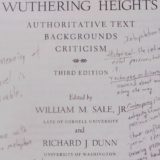Free Literature for Your Classroom with Public Domain Texts
In the wake of yesterday’s copyright weirdness, I thought today would be a good day to talk about using public domain literature in the classroom. I’ve put together a reading list (in case you haven’t noticed, I’m a list junkie) of books in the public domain that could be used in a junior high or high school literature class. You’ll find it at the end of this post.
Quick Review
If something is in the public domain–literature, art, music–then, as the Stanford Copyright & Fair Use Guide states, “it is not protected by intellectual property laws…which means it’s free for you to use without permission.”
The Stanford guide explains that most books enter the public domain because their copyrights have expired. These books include “any work published in the United States before 1923.” Other works may be released into the public domain by the author or creator. The volunteers at Librivox.org, for instance, record audio books of public domain texts and release the recordings into the public domain.
Public Domain Literature in Schools
Thanks to sites like Project Gutenberg and Librivox, there is an ever-growing repository of public domain materials that we can use in our classrooms at little to no cost. Last year I used short stories by Chekhov, Hugo, Poe and Tolstoy, to name a few.
I photocopied the stories and poems and asked students to put them in their three-ring binders, creating a dynamic textbook that grew as the year progressed. We do have a literature anthology at my school, which we used occasionally, but students can’t mark up a page with their notes as they can with the photocopied public domain texts.
Using public domain texts also allows me the freedom to change stories from year to year. I’m not dependent on the stories in the literature anthology. There are, however two big disadvantages to using public domain texts.
Disadvantages
First, relying solely on public domain texts means you are limited to teaching older, mostly Euro-centric material. Books like Bless Me, Ultima, I Know Why the Caged Bird Sings, Fahrenheit 451, To Kill a Mockingbird or Ender’s Game are not yet in the public domain, and teaching these books requires that they be purchased. Still, there are enough high-interest titles in the public domain to teach students how to read well.
Second, there are no teaching materials when you use public domain texts. Anthologies come with study questions, vocabulary words and other teaching ideas. With public domain texts you must either buy ancillary materials, find resources on the Internet or create your own materials. I actually believe this is an advantage, since it frees the teacher from dependence on someone else’s interpretation of the text. I think we give students too many study questions and vocabulary words. Hand them the text, show them how good readers read, and let them get to work on it, discussing it with them as they go.
Conclusion
I have a lot more to say about how to use public domain literature in the classroom, but for now I’ll close by linking to a recommended reading list of public domain titles that could be used in a junior high or high school classroom. There are almost seventy titles on the list, but I could have listed seven hundred. This is just a beginning. There is no poetry or drama on the list, so you won’t see authors like Walt Whitman or William Shakespeare, though their works, too, are in the public domain.
If you decide to use public domain texts, be sure to read Prepare a Gutenberg Text for eReading from Lifehacker. It will show you how to make the Gutenberg texts readable and printable.
I call the list “Open Source Literature” because, similar to programs like Firefox and Linux, users can take these texts and adapt them, change them and use them in any way they want.
Here, then is the link to Open Source Literature.













This is a great site. Do you have any interest in free literature podcasts? I’m starting one as a study guide for the GRE Literature – GREaudiobooks.com – and thought you might be interested.
Thanks!